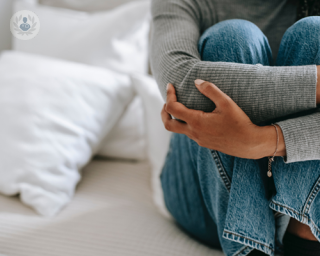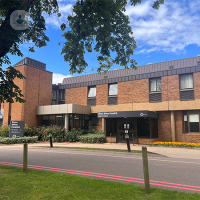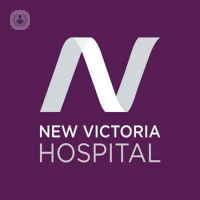What are heavy periods?
It can sometimes be difficult to know if you have particularly heavy periods because what is normal changes from person to person. However, the following signs would suggest your periods are heavy:
- You have to get up in the night to change your sanitary products.
- You need to use more than one sanitary product at once (e.g. both a pad and a tampon).
- You have to change your sanitary products once every one or two hours.
- You’re passing blood clots more than 2cm across.
- You’re bleeding for longer than a week.
It’s worth seeing the doctor if this applies to you, or if you’ve simply noticed your periods getting heavier. You should also see a doctor if you’re having period pain or bleeding between your periods. Left untreated, heavy periods can lead to iron deficiency anaemia.

What causes heavy periods?
Common causes of heavy periods include fibroids (non-cancerous growths in the womb) or endometriosis. Less common causes include:
- pelvic inflammatory disease
- polycystic ovarian syndrome
- polyps
- adenomyosis
- a hormonal imbalance caused by hypothyroidism, obesity or diabetes
- a blood clotting disorder such as Von Willebrand disease
- certain medications such as hormonal medication or anticoagulants
- using “the coil”, a type of contraception
- womb cancer or cervical cancer
Almost half of cases of heavy bleeding have no underlying cause.
What happens when you see a doctor for heavy periods?
When you visit the doctor, they will ask you about your medical history, symptoms, and any medication you’re on, and you might need to keep a diary of your bleeding. You might also have a number of tests depending on the suspected cause, including:
- a full blood test to test for iron deficiency or a blood-clotting disorder
- hysteroscopy to look inside the womb
- an ultrasound to produce an image of the tissues inside your uterus and pelvis
How are heavy periods treated?
There are many treatment options for heavy periods and it’s important that you and the doctor discuss in detail your personal preferences and future childbearing plans.
Conservative treatment options include:
- non-steroidal anti-inflammatory drugs such as ibuprofen
- tranexamic acid
- hormonal medication such as the combined oral contraceptive pill or cyclical progestogen
- an intrauterine system (IUS), an implantable device that slowly releases progestogen over time.
If these treatments are unsuccessful, or if you have fibroids or endometriosis, there are a number of procedures available aimed at removing the tissue causing the problem, including:
- uterine artery embolisation
- ultrasound surgery
- myomectomy
If you are getting lots of fibroids or severe endometriosis, and you are no longer planning to have children, endometrial ablation or hysterectomy may be recommended treatment options.
09-13-2017 02-02-2024Heavy periods
Mr Amer Raza - Obstetrics & gynaecology
Created on: 09-13-2017
Updated on: 02-02-2024
Edited by: Conor Lynch
What are heavy periods?
It can sometimes be difficult to know if you have particularly heavy periods because what is normal changes from person to person. However, the following signs would suggest your periods are heavy:
- You have to get up in the night to change your sanitary products.
- You need to use more than one sanitary product at once (e.g. both a pad and a tampon).
- You have to change your sanitary products once every one or two hours.
- You’re passing blood clots more than 2cm across.
- You’re bleeding for longer than a week.
It’s worth seeing the doctor if this applies to you, or if you’ve simply noticed your periods getting heavier. You should also see a doctor if you’re having period pain or bleeding between your periods. Left untreated, heavy periods can lead to iron deficiency anaemia.

What causes heavy periods?
Common causes of heavy periods include fibroids (non-cancerous growths in the womb) or endometriosis. Less common causes include:
- pelvic inflammatory disease
- polycystic ovarian syndrome
- polyps
- adenomyosis
- a hormonal imbalance caused by hypothyroidism, obesity or diabetes
- a blood clotting disorder such as Von Willebrand disease
- certain medications such as hormonal medication or anticoagulants
- using “the coil”, a type of contraception
- womb cancer or cervical cancer
Almost half of cases of heavy bleeding have no underlying cause.
What happens when you see a doctor for heavy periods?
When you visit the doctor, they will ask you about your medical history, symptoms, and any medication you’re on, and you might need to keep a diary of your bleeding. You might also have a number of tests depending on the suspected cause, including:
- a full blood test to test for iron deficiency or a blood-clotting disorder
- hysteroscopy to look inside the womb
- an ultrasound to produce an image of the tissues inside your uterus and pelvis
How are heavy periods treated?
There are many treatment options for heavy periods and it’s important that you and the doctor discuss in detail your personal preferences and future childbearing plans.
Conservative treatment options include:
- non-steroidal anti-inflammatory drugs such as ibuprofen
- tranexamic acid
- hormonal medication such as the combined oral contraceptive pill or cyclical progestogen
- an intrauterine system (IUS), an implantable device that slowly releases progestogen over time.
If these treatments are unsuccessful, or if you have fibroids or endometriosis, there are a number of procedures available aimed at removing the tissue causing the problem, including:
- uterine artery embolisation
- ultrasound surgery
- myomectomy
If you are getting lots of fibroids or severe endometriosis, and you are no longer planning to have children, endometrial ablation or hysterectomy may be recommended treatment options.


Is my period cycle normal?
By Miss Aruna Ramineni
2024-11-21
Everyone’s period cycles are different and many things can affect them. But how can you tell if there is something wrong? When should you see a doctor about your periods? And why can menstrual cycles vary so much? We asked leading obstetrician/gynaecologist Miss Aruna Ramineni, who has the answers. See more


Know the difference between regular period pain and endometriosis
By Mr Ian Currie
2024-11-21
Unfortunately, for many women endometriosis can be hard to detect. The symptoms can often can mimic heavy, painful periods which ultimately leads to a delayed diagnosis and serious consequences to your pelvic health. Mr Ian Currie, a consultant obstetrician and gynaecologist, walks us through the differences between regular period pains and endometriosis to help familiarise women on the signs and symptoms of this condition. See more


What's the connection between heavy periods and ovarian cysts?
By Dr Sangeetha Devarajan
2024-11-21
Heavy periods, also known as menorrhagia, can sometimes be connected to ovarian cysts, though not always directly. Understanding this connection requires a look at how ovarian cysts develop and how they can impact the menstrual cycle. We speak to leading obstetrician and gynaecologist Dr Sangeetha Devarajan about this important topic. See more


What might recurrent heavy periods be a sign of?
By Miss Neelam Potdar
2024-11-21
In this article here, Miss Neelam Potdar, a revered consultant gynaecologist, reveals what recurrent heavy periods could be a sign of, whilst also outlining the most commonly associated symptoms. See more
Experts in Heavy periods
-
Dr Karen Joash
Obstetrics & gynaecologyExpert in:
- Polycystic ovary syndrome (PCOS)
- Obstetric and gynecologic ultrasound
- Fibroids
- Polyps
- Heavy periods
- Hysterectomy
-
Dr Shazia Malik
Obstetrics & gynaecologyExpert in:
- Menopause
- Caesarean
- Miscarriage
- Pregnancy counselling
- Polycystic ovary syndrome (PCOS)
- Heavy periods
-
Mr Mahantesh Karoshi
Obstetrics & gynaecologyExpert in:
- Heavy periods
- Polycystic ovary syndrome (PCOS)
- Infertility
- Ovarian cyst
- Adenomyosis
- Miscarriage
-
Mr Nitish Narvekar
Obstetrics & gynaecologyExpert in:
- Heavy periods
- Endometriosis
- Endoscopic surgery
- Fibroids
- Uterine malformations
- Infertility
-
Mr Jullien Brady
Obstetrics & gynaecologyExpert in:
- Colposcopy
- Heavy periods
- Pelvic pain
- Menopause
- Ovarian cyst
- Abnormal smear test
- See all

The Kensington Wing - Private Maternity
The Kensington Wing - Private Maternity
Chelsea and Westminster Hospital, 3rd Floor, 369 Fulham Rd., London
No existe teléfono en el centro.
By using the telephone number provided by TOP DOCTORS, you automatically agree to let us use your phone number for statistical and commercial purposes. For further information, read our Privacy Policy
Top Doctors

Three Shires Hospital - part of Circle Health Group
Three Shires Hospital - part of Circle Health Group
The Avenue, Northampton NN1 5DR
No existe teléfono en el centro.
By using the telephone number provided by TOP DOCTORS, you automatically agree to let us use your phone number for statistical and commercial purposes. For further information, read our Privacy Policy
Top Doctors

New Victoria Hospital
New Victoria Hospital
184 Coombe Lane West, Kingston upon Thames, KT2 7EG
No existe teléfono en el centro.
By using the telephone number provided by TOP DOCTORS, you automatically agree to let us use your phone number for statistical and commercial purposes. For further information, read our Privacy Policy
Top Doctors
-
The Kensington Wing - Private Maternity
Chelsea and Westminster Hospital, 3rd Floor, 369 Fulham Rd., London , Central LondonExpert in:
- Maternity care
- Ultrasound
- Pregnancy
- Multiple pregnancy
- Obstetrics and Gynaecology
- Pre-eclampsia
-
Three Shires Hospital - part of Circle Health Group
The Avenue, Northampton NN1 5DR, NorthamptonExpert in:
- Abdominal ultrasound
- Abdominoplasty
- Acne
- Allergies nose and ears
- Allergy
- Voice disorders
-
New Victoria Hospital
184 Coombe Lane West, Kingston upon Thames, KT2 7EG, South LondonExpert in:
- Cardiology
- General Surgery
- Orthopaedic surgery
- Breast augmentation
- Pain management
- Spine
- See all
- Most viewed diseases, medical tests, and treatments
- PGT-A
- PGT-M
- Ovulatory disorders
- Fertility preservation
- Tubal factor infertility
- Female infertility
- Surrogacy
- Menopause support
- Hormone therapy
- Pelvic ultrasound








